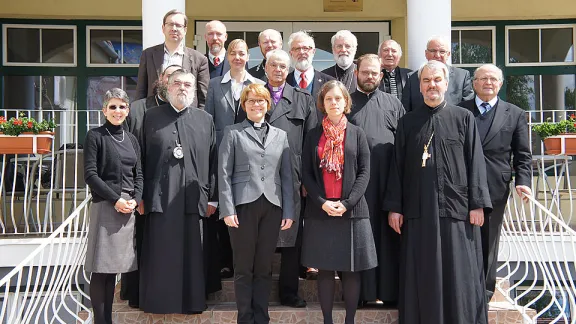
Members of the Lutheran-Orthodox Joint Commission at the preparatory meeting in Sibiu, Romania. © LWF
LWF “Stand Up and Walk” Virtual Conference: Diakonia Is Gospel in Action
(LWI) Service to the marginalized offers hope to the world, a 5 June virtual conference of The Lutheran World Federation (LWF) on diakonia [church-related social services] involving hundreds of church activists around the world has emphasized.
“Diaconal work gives clear proof that there is hope, real hope for human kind,” said Mami Brunah Aro Sandaniaina of the Malagasy Lutheran Church. The LWF Council member from Madagascar was among 400 pastors, congregational leaders, professional diaconal workers and volunteers from 64 countries who participated in the LWF Internet-based conference that involved speeches and online discussions in English, French, German, Spanish and Indonesian.
The conference on the theme “Stand Up and Walk” was based on the story about Jesus healing a paralytic. It is part of a series of events by the LWF Department for Mission and Development (DMD) aimed at supporting member churches’ capacity to undertake diaconal ministries and connect diaconal workers globally.
For those without hope, crippled by poverty, looking for enough food to eat every day, the church’s diaconal service offers evidence of a loving God, added Sandaniaina.
“The Christian love of the church in communion, which can find the means to help them, is proclaiming practically by diaconal work the existence of the eternal God and God’s goodness, whether on this earth or in the kingdom that is yet to come,” she said.
In a keynote address, LWF General Secretary Rev. Martin Junge noted that holding a virtual conference made it available to many more participants while significantly reducing its ecological footprint.
“It is important to live and to work together so that we are also mindful of the ecological challenges that the human family is facing,” Junge said.
Through God’s grace, Christians are called into relationship with their suffering neighbors, the general secretary said. “Diakonia is ultimately and from the very beginning grounded in a theological understanding of how we are the church in our world, how we are Christians, how we live out our baptism in this world.”
Rev. Dr Kjell Nordstokke, professor of diakonia at Diakonhjemmet University College in Oslo, Norway, noted in his keynote address that diakonia is the gospel in action.
“The term diakonia reminds us of Jesus’ service, of his care and healing and his view and care for marginalized people and the way he included and also empowered them for participation in mission,” said Nordstokke, a former director of DMD.
“In the end we are all included in God’s diakonia, transformation, reconciliation and empowerment. That is how we experience God’s grace and at the same time we are each called to participate in that same diakonia by God’s grace for the healing of the world,” added Nordstokke.
An assessment of the virtual conference is underway but initial reports indicate that a lively exchange took place, with some 600 comments logged. Participants included numerous individuals and sizeable groups from Bolivia, Cambodia, El Salvador, Indonesia, Myanmar and North America.


